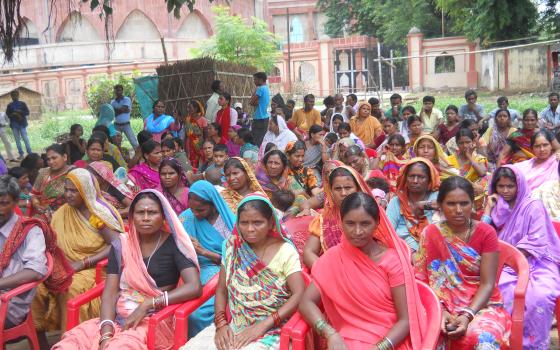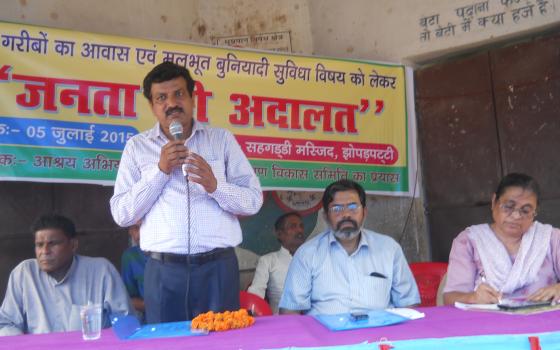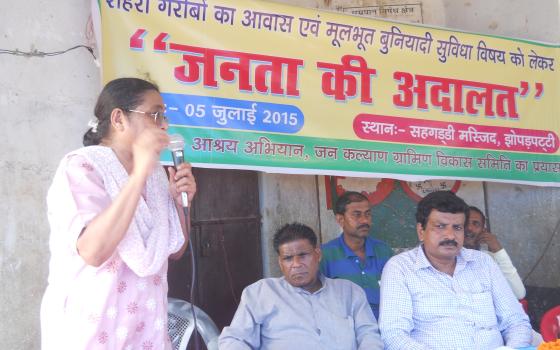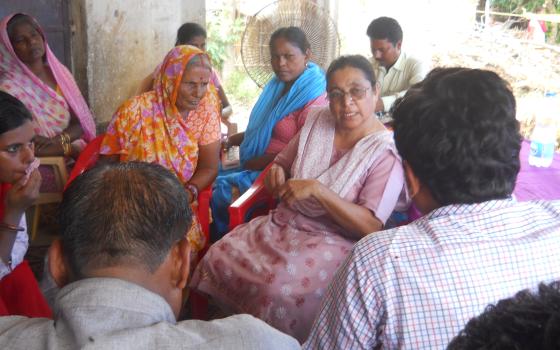In a democratic socialist country, the onus of taking care of the needs of the people falls on the ruling party of a state. In India people vote for their representatives and send them to parliament so that they can raise the issues that affect the people and work out amicable solutions by putting policies in place. Often these policies spring from agitations that force people to take to the streets — or out of sheer desperation for survival. The situation turns volatile when we know there is no alternative and people are unable to live a dignified life.
We, at Aashray Abhiyan (Campaign for Shelter Rights), have over the past decade taken this campaign for decent housing forward by using various processes. We adopt the methodology — educate, organize, agitate — among the homeless communities, which are close to 5,000 families. The numbers have swelled over the past five years. When we began we never thought that their response would be so overwhelming. We have been calling the government to accountability to implement its own policy (of recognizing 20 huts in one place as a slum) and ensure that the homeless community of Patna gets housing.
We have adopted democratic processes of protest such as marches to the chief minister’s residence, sit-in protests, press conferences and conventions. Nothing seems to have struck a chord with an insensitive administration and government. Yet the struggle has to go on; rights have to be demanded and maybe even snatched because asking does not work.
To counteract the impasse in which we found ourselves, we contacted some attorney advocates who are socially oriented and asked them to preside over a “People’s Parliament.” We identified an open space and invited at least four communities of the vicinity to place their grievances before the advocates who are practicing in the Hon’ble Patna High Court. We are hoping they will guide us and, if necessary, file a lawsuit.
The sky was overcast and as the people began to assemble, we each hoped that the rain would hold off until the program concluded. The three advocates from the court who presided over the function listened with great intent to the people as they came forward and stated very harsh facts about their situations.
Ram Parvesh, was very emotionally charged when he said, “We have spent our entire life, more than five decades here, and today the government in the name of development is trying to evict us and desires to have a park in place here. But we also have decided that we will not leave this place, come what may.”
Rukmani Devi led a group of women and told us that, “We are prepared to collect money if we have to file a case even if we have to appeal to the Supreme Court of India.” Such a positive response from a community that is living on the bare minimum raises our hearts to God with gratitude. It also breaks the myth that many of us carry, that the poor are lazy and do not wish to work.
Pushpa Devi said, “Why not? When we want to get housing from the government then we should try our best to contribute our might.”
Most of the participants have been living in the same places for the past five decades but there has not been a single intervention by the government machinery to improve their fate. Denial of basic amenities like safe drinking water, toilets and bathing rooms, drainage and sewage pipes and electricity are among the government’s failure. Though each of these residents casts his or her vote at every election, be it at state or national level, the people’s lot has not been improved.
After approximately three hours the Parliament was adjourned with the assurance of the advocates that they would form a team and join the people who live in the slums in their struggle. The people who participated in the Parliament have high hopes that the formation of a team of advocates will act as a pressure group on the government.
There is a need to continue to fight the system and keep up the struggle, so that the government will think twice before it plans to evict people.
As I reflect on the situation here in Bihar I am always inspired by the courage the women have in the face of such odds. They are the ones who give life to a movement.
Women have contributed largely to the building of homes and nations, yet across the globe they are always secondary. Women and the poor fall under the lowest group; there is no respite for them.
In a particularly spiritual country like ours where Gods and Goddesses find a place in every home; where from morning till night people never stop visiting religious places; where spiritual exercises are the norm in most homes, I begin to wonder when the status of women will change. As long as spiritual practices and life run on two parallel lines there can never be any change. For us in India, who have lost a very good human being in the person of late Dr. A.P.J. Abdul Kalam, a man who walked the talk, the challenge to us who loved our president would be to continue working hard, keep up the struggle and never wait for the fruits. God, in his own time, will grant us the fruits.
[Dorothy Fernandes a Sister of the Presentation of the Blessed Virgin Mary from India. She presently serves as Vice Provincial of the Indian province while continuing to be deeply engaged with the urban poor of Patna, Bihar.]




